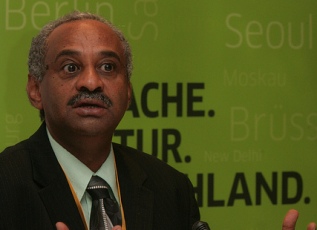Prominent Sudan journalist detained over comments on border fighting
May 8, 2012 (KHARTOUM) – Faisal Mohamed Salih, a Sudanese journalist, was detained on Tuesday by agents of the National Security and Intelligence Services (NISS) after being harassed for weeks over comments he made on fighting in the country’s border state of South Kordofan, Sudan Tribune has learned.

Prior to the arrest, which took place at his home in the Sudanese capital Khartoum, Salih spent almost three weeks complying with NISS orders to report daily to their office near Shendi bus station in Khartoum North.
He was first summoned by the NISS on 24 April for what turned out to be an investigation into comments he made four days earlier during an interview with the Qatar-based Al-Jazeera Arabic TV.
The subject of the interview was Khartoum’s allegations that neighbouring South Sudan was actively supporting attacks by the rebel coalition Sudanese Revolutionary Forces (SRF) in South Kordofan.
In the interview, Faisal suggested that Khartoum was using South Sudan as a scapegoat for its failure to confront the root causes of South Kordofan’s rebellion, which he attributed to unimplemented provisions of the 2005 Comprehensive Peace Agreement (CPA) between the then north and south Sudan.
Faisal opined that the Sudanese government should seek a negotiated settlement to the crisis in the region, and warned of humanitarian and political consequences if it remains committed to a military solution.
Sudanese president Omer Hassan Al-Bashir has rejected talks with the rebels in the past and pledged to crush the rebellion of the Sudan People’s Liberation Movement- North (SPLM-N) in South Kordofan and Blue Nile.
SPLM-N rebels and their allies among the Darfur rebel groups, particularly after South Sudan’s attack and occupation of Heglig in April, are accused of being mercenaries used by the South Sudanese government to put pressure Khartoum during the talks over outstanding post-secession issues.
In a message he sent on 7 May to human rights activists and posted on a number of Sudanese websites, Faisal said that on his first day of investigation, which lasted until midnight, NISS agents said that he should not have made such comments to foreign media. They further charged that some of the comments he made were “inappropriate” and that he should observe caution when speaking to international press.
He was later ordered to report on daily basis to the NISS office until the investigation is complete. The Sudanese journalist said NISS people told him they want to continue their “dialogue” with him,
For the next 14 days, Salih said he kept coming to the NISS office where he would wait for hours at the reception without any investigations.
“It then became clear to me that the purpose is just to humiliate me, and hold me up from doing my work as a kind of a hidden punishment that is unjustifiable and has no basis in law” his message reads.
The journalist added that he later resolved not to turn up on Tuesday as ordered, a decision that apparently led to his arrest.
Faisal is no stranger to confrontations with security apparatus. In May 2011, he was sued along with other journalists by the NISS for criticising the alleged rape of a female activist by NISS agents. During the first years of the regime he was detained for several months after which he left the country to Cairo where he remained in exile for many years.
His arrest has quickly elicited condemnation from local and global rights groups. Amnesty International (AI) issued a call for urgent action and warned that he is “at serious risk of torture and other ill-treatment.”
AI went on to demand the Sudanese authorities to immediately and unconditionally release Faisal.
Sudan Change Now, a civil society group, and the African Centre for Justice and Peace Studies also issued statements calling for the immediate release of Faisal and other imprisoned journalists and activists.
Security authorities in Sudan are known for targeting press freedom through a number of tactics, including confiscating whole editions of newspapers after they have been printed and instigation of legal proceedings against journalists.
Most recently, the NISS reportedly began banning individual journalists from writing. According to Reem Abbas Shawkat, a Sudanese journalist and blogger, there are currently 12 journalists banned by the NISS.
Although the NISS officially ceased to practice direct, pre-printing censorship on newspapers, it sometimes orders chief editors via sms text messages not to report on certain events in the next day’s edition.
On 3 May, as the world celebrated World Press Freedom day, AI issued a report noting intensification of press repression in Sudan since the beginning in January last year and the wave of popular uprisings in North Africa and the Middle East.
The report noted that “Since May 2011, the Sudanese authorities have shut down 15 newspapers, confiscated more than 40 newspaper editions, arrested eight journalists and banned two from writing, seriously curtailing freedom of expression.”
(ST)
